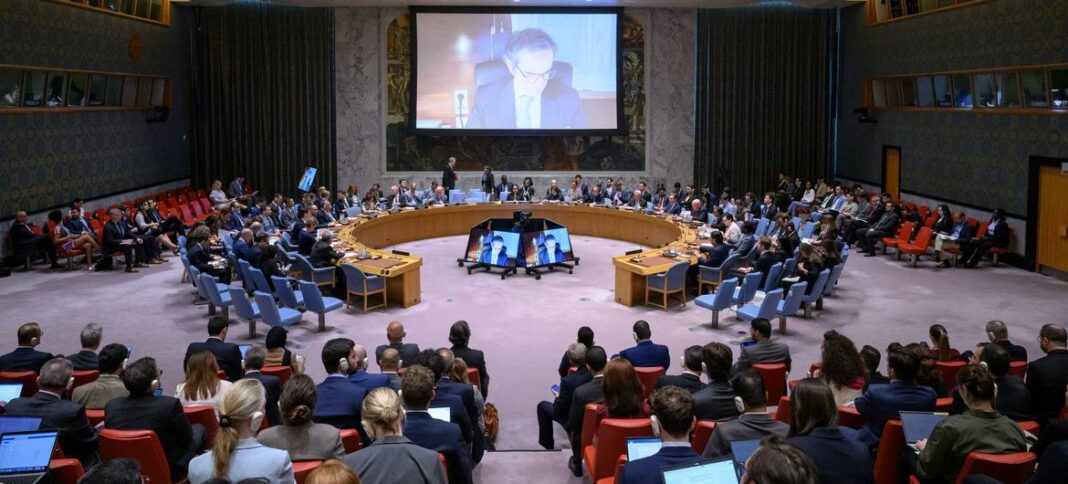Estimated reading time: 6 minutes
The Council cleared its original schedule to address the rapidly evolving crisis, also hearing from the head of the UN-backed international nuclear watchdog, who warned of the grave risks to regional stability and nuclear safety.
Tweet URL
Overnight from Thursday into Friday, Israeli military strikes targeted nuclear facilities across Iran, including the Natanz enrichment site. Media reports indicate that Hossein Salami, the head of the Islamic Revolutionary Guard Corps (IRGC), as well as several prominent nuclear scientists, were among those killed.
The strikes also caused significant damage, including reportedly dozens of civilian casualties. Airspace in the region has been largely closed and security forces are on high alert.
Additional Israeli strikes were reported late Friday local time as well as ballistic missile launches by Iran which have reportedly struck parts of Israel, including Tel Aviv.
Avoid conflagration at all costs: DiCarlo
Rosemary DiCarlo, UN Under-Secretary-General for political affairs told ambassadors that the repercussions of the attacks were already reverberating.
“I reaffirm the Secretary-General’s condemnation of any military escalation in the Middle East,” she said, urging both Israel and Iran to exercise maximum restraint and “avoid at all costs a descent into deeper and wider regional conflict”.
She also noted that the military escalation came just as “some significant diplomatic developments” were unfolding, including the planned resumption of United States-Iranian talks in Oman at the weekend. Latest reports indicate that Iran will no longer attend.
Ms. DiCarlo urged parties to stay the diplomatic course.
“A peaceful resolution through negotiations remains the best means to ensure the peaceful nature of Iran’s nuclear programme,” she said.
“We must at all costs avoid a growing conflagration which would have enormous global consequences.”
Nuclear watchdog head urges protection of atomic sites
Also briefing the Council, Rafael Grossi, Director General of the International Atomic Energy Agency (IAEA), said his agency was in constant contact with the Iranian Nuclear Regulatory Authority to assess the status of affected facilities and determine broader impacts on nuclear safety and security.
He stressed that nuclear sites must never be targeted – under any circumstances.
“Such attacks have serious implications for nuclear security, nuclear safety and safeguards, as well as regional and international peace and security,” Mr. Grossi said.
He stands ready to travel to the region at the earliest opportunity, he added, to assess the situation and support safety, security and non-proliferation efforts in Iran.
“It is clear that the only sustainable path forward for Iran, for Israel, the entire region and the international community is one grounded in dialogue and diplomacy to ensure peace, stability and cooperation.”
Mr. Grossi concluded by offering the IAEA as a neutral platform where “facts prevail over rhetoric” and where technical engagement replace escalation.
“I reaffirm my personal and the agency’s readiness to facilitate dialogue and support efforts that promote transparency, security and the peaceful resolution of nuclear issues in Iran.”
Russia ‘strongly condemns’ Israeli actions
Russian Ambassador Vassily Nebenzia warned that Israel’s actions in the Middle East are “pushing the region to a large-scale nuclear catastrophe.”
“This completely unprovoked attack, no matter what Israel says to the contrary, is a gross violation of the UN Charter and international law,” he said, expressing Russia’s “strong condemnation” of the strikes.
He accused “Western members” of the 2015 Iran nuclear deal – formally known as the Joint Comprehensive Plan of Action (JCPOA) – of contributing to the current crisis through their policies toward Iran and its nuclear programme.
“They have been doing everything to fuel the escalation and essentially incited it,” he told ambassadors.
Mr. Nebenzia concluded by urging renewed diplomatic efforts. “Once again, settling issues related to the Iranian nuclear programme is only possible if a peaceful, political, and diplomatic pathway is followed,” he said.
‘Iran has the right to self-defence’: Pakistan
Pakistan’s Ambassador Asim Iftikhar Ahmad told the Council that Israel’s “blatant provocations” pose a grave threat to regional peace and stability.
“Iran has the right to self-defence under Article 51 of the UN Charter,” he said, alleging that Israel’s actions in Gaza, Syria, Lebanon and Yemen “reflect a continuing pattern of unilateral militarism”.
“The fact that these attacks against Iran have happened in the middle of a negotiations process aimed at finding a peaceful diplomatic solution to the Iranian nuclear issue makes it all the more morally repugnant and against international norms,” he added.
Mr. Ahmad urged all parties to avoid further escalation and prioritise dialogue. He also called on the Security Council to “hold the aggressor accountable for its actions. This Council must deny Israel the free hand and the impunity with which it continues to operate in defiance of international law and international opinion.”
Iran must not acquire nuclear weapons: US
Speaking for the United States, McCoy Pitt, a senior State Department official, accused Iran of having launched “unprovoked, direct and proxy attacks” against Israeli civilians and of spreading of terror, instability and human suffering in the region.
“As President Trump has repeatedly said this dangerous regime cannot be allowed to have nuclear weapons,” he said.
Mr. Pitt noted that the US had been informed of the Israeli strikes in advance but was not militarily involved.
“Our absolute, foremost priority is the protection of US citizens, personnel and forces in the region,” he said.
He further said that the US will continue to seek a diplomatic resolution that ensures Iran will never acquire a nuclear weapon or pose a threat to instability in the Middle East.
“Iran’s leadership will be wise to negotiate at this time,” he said.
Iran calls for accountability
Iranian Ambassador Amir Saeid Iravani told the Security Council he was addressing the body on behalf of his government and people “with the utmost urgency and grave alarm.”
“We strongly and unequivocally condemn the barbaric and criminal attack, a series of targeted assassinations against senior military officials, nuclear scientists and innocent civilians,” he said.
“These deliberate and systematic killings were not only illegal and inhuman, a chilling display of calculated aggression. These atrocities constitute a clear act of State terrorism and flagrant violation of international law,” he added.
He said Israel’s attacks on protected nuclear facilities defied not only the fundamental principles of international law but also “common conscience,” warning that damage to such sites could release catastrophic radiological consequences across the region and beyond.
“Only a regime devoid of humanity and responsibility would endanger millions of lives in pursuit of its destructive ambitions,” Mr. Iravani said.
“Those who support this regime, with the United States at the forefront, must understand that they are complicit. By aiding and enabling these crimes, they share full responsibility for the consequences.”
Israel defends ‘act of national preservation’
Israeli Ambassador Danny Danon began his remarks by reminding Security Council members that – as they spoke – Iranian ballistic missiles were striking Israeli cities and injuring civilians.
He said Israel’s strikes were preventative and carried out with “precision, purpose, and the most advanced intelligence” available.
The mission, he added, was clear, “dismantle Iran’s nuclear programme, eliminate the architects of its terror and aggression and neutralize the regime’s ability to follow through on its repeated public promise to destroy the State of Israel.”
Mr. Danon accused Iran of taking steps toward building a nuclear arsenal. He also criticized the international community for failing to act and rein in Tehran.
“Israel did not act recklessly – we waited,” he said.
“This was an act of national preservation. It was one we undertook alone, not because we wanted to, but because we were left no other option.”
United Nations.





































